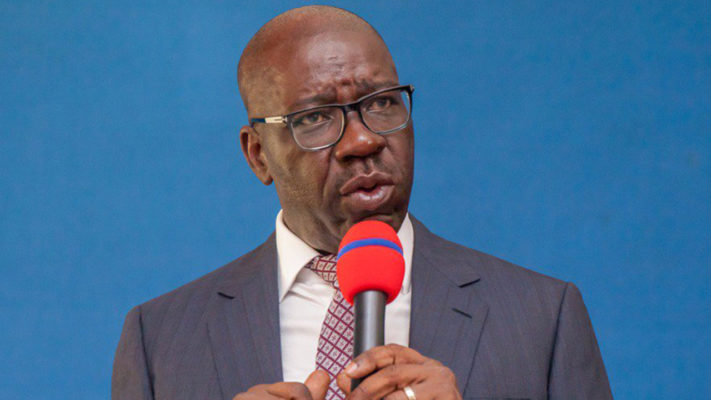Edo Civil Society Organizations (EDOSCO), on Thursday, accused the State Governor, Godwin Obaseki, of betraying the trust of the Edo people by embracing the National Livestock Transformation Plan of the Federal Government.
The group said Obaseki had gone against the agreement of the southern state governors to enact laws banning open and indiscriminate grazing, rearing of livestock.
Briefing journalists in Benin City, the Edo state capital, the Interim Chairman of EDOSCO, Bishop Osadolor Ochei, said the governor did not inform citizens of his intention to meet with President Muhammadu Buhari for the state to key into the National Livestock Transformation Plan, which was known as Rural Grazing Area (RUGA).
He maintained that the concept of the initiative is for the federal government to create reserves as ranches for pastoralists that will serve as settlements for herders in states.
Ochie said that pastoral farming is a private venture that must be conducted to not infringe on citizens’ rights.
He noted that the movement of cattle to graze on farmlands or constitute nuisance should be prohibited in the 21st century as he proposed a minimum of six months imprisonment as a penalty for defaulters of the anti-open grazing law.
According to him, “The Edo state governor on the 11th of May, 2021 alongside other 15 out of 17 governors under the aegis of Governors of Southern Nigeria met in Asaba to issue a communiqué on open grazing ban. It was a unanimous decision by the governors to address the high rate of insecurity open grazing had posed in the region.
“To that extent, Edo state cannot unilaterally dissociate itself from such a unified agreement. It amounts to a betrayal of confidence and would lead to inertia on the part of other Southern states for future collaboration geared towards mutual and collective benefits in the region.
“Furthermore, the Edo state government decided to hold a town hall meeting on the 11th of October, 2021 for the deliberation on the proposed anti-open grazing law after pressures from citizens and critical stakeholders. It was agreed by all that, the ban on open grazing is a prerequisite to putting a total end to the herders/farmers clash and other criminal activities associated with it.
“Never during the meeting did the governor inform participants of his intention to meet with President Muhammadu Buhari for Edo state to key into the National Livestock Transformation Plan which was initially code-named Rural Grazing Area (RUGA).
“The concept is for the federal government to create reserves as ranches for pastoralists that will serve as settlements for herders in states that subscribe to the plan. Several states have rejected the plan because they felt cattle rearing is a private business venture and should be left for the private investors to build ranches themselves instead of creating another community or colony of herders in states. They fear for future claims to such colonies which could lead to a communal clash.”
He urged Obaseki to give Edo people details of his meeting with President Muhammadu Buhari and clear the air on “Whether the Edo state government has data of the cattle owners that graze the state?
“If the federal government is releasing funds to individuals that own cattle to build ranches or the federal government intends to acquire reserves for them?
“Has Edo state government trained or plans to train indigenes on the practice of managing and tendering cattle in ranches or the same crop of occupational herders are still going to be engaged?”
The group demanded that “Edo state should promulgate a law to prohibit open grazing of cattle with stiff punishment for violators, that all cattle owners must ranch their cattle.
“That it is not the business of government to provide lands for cattle owners and that a unit of the Edo state vigilante network should be duly trained, paid, and deployed in the enforcement of the law with support from the Nigeria Police Force.
“Any cattle owner that allows his cattle to graze on a farmer’s land or destroy any property should be made to serve a jail term not less than six months and pay compensation to the farmer whose farm is destroyed. He should also stand the chance of forfeiting the cattle to the state government.
“The provision of colonies to cattle owners should be discouraged. Every cattle owner should purchase/lease land for ranching and/or any other farming operations,” he added.




